- Home
- Georgette Heyer
Arabella Page 24
Arabella Read online
Page 24
This gesture a little relieved his feelings, and the first glass of brandy, tossed at one gulp down his throat, had a still more heartening effect upon him. He looked again at the twenty-pound bill, still clasped between his fingers. He remembered that Chuffy had named twenty pounds as the minimum stake permitted to punters at the Nonesuch. Such a coincidence was surely too marked to be ignored. The second glass of brandy convinced him that here in his hand lay his last chance of saving himself from irretrievable ruin and disgrace.
Not being accustomed to drinking neat brandy, he was obliged before setting out for Long’s Hotel to swallow a damper in the form of a glass of porter. This had a sobering effect and the walk through the streets to Long’s put him in tolerable shape to do justice to maintenon cutlets, and the hotel’s famed Queensbury hock. He had made up his mind to be guided by Fate. He would lay down his twenty guineas upon a card chosen at random from the livret: if it turned up, he would take it for a sign that his luck had changed at last, and play on until he had covered all his debts; if he lost, he would be very little worse off than he was already, and could, at the worst, cut his throat, he supposed.
When he and Lord Wivenhoe entered the faro-room at the Nonesuch, Mr Beaumaris, holding the bank, had just completed a deal, and had tossed the pack on to the floor. He raised his eyes, as a waiter laid a fresh pack before him, and looked straight across to the door. The lure of hazard had drawn all but one other of the club’s doyens from the room, and that one, Lord Petersham, was lost in one of his fits of deep abstraction.
Damn Petersham! Thought Mr Beaumaris, on the horns of a dilemma. Why must he choose this of all moments to dream of tea?
That amiable but vague peer, perceiving Lord Wivenhoe, smiled upon him with the doubtful air of one who seemed to recollect seeing his face before. If he took notice of a youthful stranger within the sacred precincts of the club, he gave no sign of it. Mr Warkworth stared very hard at Bertram, and then glanced towards the head of the table. Lord Fleetwood, filling his glass, frowned, and also looked to the Nonpareil.
Mr Beaumaris gave an order to the waiter to bring him another bottle of burgundy. One blighting word from him, and the stranger would have nothing to do but bow himself out with what dignity he could muster. There was the rub: the boy would be unbearably humiliated, and one could not trust that young fool, Wivenhoe, to smooth over the rebuff. He would be far more likely to kick up a dust over the exclusion of one his friends, placing the unhappy Bertram in a still more intolerable position.
Lord Wivenhoe, finding places for himself and Bertram at the table, was casually making Bertram known to his neighbours. One of these was Fleetwood, who favoured Bertram with a curt nod, and again looked under his brows at the Nonpareil; the other, like most of the men in the room, was content to accept any friend of Chuffy’s without question. One of the older men said something under his breath about babes and sucklings, but not loudly enough to be overheard.
Mr Beaumaris glanced round the table. ‘Stakes, gentlemen,’ he said calmly.
Bertram, who had changed his bill for one modest rouleau, thrust it in a quick movement towards the queen in the livrat. Other men were placing their bets; someone said something which made his neighbour laugh; Lord Petersham sighed deeply, and deliberately pushed forward several large rouleaus, and ranged them about his chosen cards; then he drew a delicately enamelled snuff-box from his pocket, and helped himself to a pinch of his latest blend. A pulse was beating so hard in Bertram’s throat that it almost hurt him; he swallowed, and fixed his eyes on Mr Beaumaris’s hand, poised above the pack before him.
The boy has been having some deep doings, thought Mr Beaumaris. Shouldn’t wonder if he’s rolled-up! What the devil possessed Chuffy Wivenhoe to bring him here?
The bets were all placed; Mr Beaumaris turned up the first card, and placed it to the right of the pack.
‘Scorched again!’ remarked Fleetwood, one of whose bets stood by the card’s counterpart.
Mr Beaumaris turned up the Carte Anglaise, and laid it down to the left of the pack. The Queen of Diamonds danced before Bertram’s eyes. For a dizzy moment he could only stare at the card; then he looked up, and met Mr Beaumaris’s cool gaze, and smiled waveringly. That smile told Mr Beaumaris quite as much as he had need to know, and did nothing to increase his enjoyment of the evening ahead of him. He picked up the rake beside him, and pushed two twenty-guinea rouleaus across the table. Lord Wivenhoe called for wine for himself and his friend, and settled down to plunge with his usual recklessness.
For half-an-hour the luck ran decidedly in Bertram’s favour, and Mr Beaumaris was encouraged to hope that he would rise from the table a winner. He was drinking fairly steadily, a flush of excitement in his cheeks, his eyes, glittering a little in the candlelight, fixed on the cards. Lord Wivenhoe sat cheerfully losing beside him. He was soon punting on tick, scrawling his vowels, and tossing them over to the bank. Other men, Bertram noticed, did the same. There was quite a pile of paper before Mr Beaumaris.
The luck veered. Three times did Bertram bet heavily on the bank’s card. He was left with only two rouleaus, and staked them both, sure that the bank could not win his money four times in succession. It could. To his own annoyance, Mr Beaumaris turned up the identical card.
From then, on, he accepted with an unmoved countenance, vowel upon vowel from Bertram. It was quite impossible to tell the boy either that he would not take his vouchers, or that he would be well-advised to go home. It was even doubtful whether Bertram would have listened to him. He was in the grip of a gamester’s madness, betting recklessly, persuaded by one lucky chance that the luck smiled upon him again, convinced when he lost that ill-fortune could not last. That he had the least idea of the sum he already owed the bank, Mr Beaumaris cynically doubted.
The evening broke up rather earlier than usual, Mr Beaumaris having warned the company that he did not sit after two o’clock, and Lord Petersham sighing that he did not think he should take the bank over tonight. Wivenhoe, undaunted by his losses, said cheerfully: ‘In the basket again! What do I owe, Beaumaris?’
Mr Beaumaris silently handed his vowels to him. While his lordship did rapid sums in mental addition, Bertram, the flush dying out of his cheeks, sat staring at the paper still lying in front of Mr Beaumaris. He said jerkily: ‘And I?’ And stretched out his hand.
‘Dipped, badly dipped!’ said Wivenhoe, shaking his head. ‘I’ll send you a draught on my bank, Beaumaris. The devil was in it tonight!’
Other men were totting up their losses; there was a noise of lighthearted conversation dinning in Bertram’s ears; he found that his vowels totalled six hundred pounds, a sum that seemed vast to him, almost incredible. He pulled himself together, pride coming to his rescue, and rose. He looked very white now, and ridiculously boyish, but he held his head well up, and spoke to Mr Beaumaris perfectly calmly. ‘I may have to keep you waiting for a few days, sir,’ he said. ‘I – I have no banking accommodation in London, and must send to Yorkshire for funds!’
What do I do now? Wondered Mr Beaumaris. Tell the boy the only use I have for his vowels is as shaving-papers? No: he would enact me a Cheltenham tragedy. Besides, the fright may do him a world of good. He said: ‘There is no hurry, Mr Anstey. I am going out of town tomorrow for a week, or five days. Come and see me at my house – let us say, next Thursday. Anyone will tell you my direction. Where are you putting up?’
Bertram replied mechanically: ‘At the Red Lion, in the City, sir.’
‘Robert!’ called Fleetwood, from the other side of the room, where he was engaged in a lively argument with Mr Warkworth. ‘Robert, come and bear me out! Robert!’
‘Yes, in a moment!’ Mr Beaumaris returned. He detained Bertram a moment longer. ‘Don’t fail!’ he said. ‘I shall expect to see you on Thursday.’
He judged it to be impossible to say more, for there were people all round them, and it was plain that the b
oy’s pride would not brook a suggestion that his gaming-debts should be consigned to the flames.
But he was still frowning when he reached his house, some time later. Ulysses, gambolling and squirming before him, found that his welcome was not receiving acknowledgement, and barked at him. Mr Beaumaris bent, and patted him absentmindedly. ‘Hush! I am not in the mood for these transports!’ he said. ‘I was right when I told you that you were not destined to be the worst of my responsibilities, was I not? I think I ought to have set the boy’s mind at ease: one never knows, with boys of that age – and I didn’t like the look in his face. All to pieces, I have little doubt. At the same time, I’ll be damned if I’ll go out again at this hour of night. A night’s reflection won’t hurt him.’
He picked up the branch of candles that stood upon the hall-table, and carried it into his study, and to his desk by the window. Seeing him sit down, and open the ink-standish, Ulysses indicated his sentiments by yawning loudly. ‘Don’t let me keep you up!’ said Mr Beaumaris, dipping a pen in the standish, and drawing a sheet of paper towards himself.
Ulysses cast himself on the floor with a flop, gave one or two whines, bethought him of a task left undone, and began zealously to clean his forepaws.
Mr Beaumaris wrote a few rapid lines, dusted his sheet, shook off the sand, and was just about to fold the missive, when he paused. Ulysses looked up hopefully. ‘Yes, in a minute,’ said Mr Beaumaris. ‘If he has quite outrun the constable –’ He laid down the paper, drew out a fat pocket-book from his inner pocket, and extracted from it a bill for a hundred pounds. This he folded up in his letter, sealed the whole with a wafer, and directed it. Then he rose, and to Ulysses’ relief indicated that he was now ready to go to bed. Ulysses, who slept every night on the mat outside his door, and regularly, as a matter of form, challenged Painswick’s right to enter that sacred apartment each morning, scampered ahead of him up the stairs. Mr Beaumaris found his valet awaiting him, his expression a nice mixture of wounded sensibility, devotion to duty, and long-suffering. He gave the sealed letter into his hand. ‘See that that is delivered to a Mr Anstey, at the Red Lion, somewhere in the City, tomorrow morning,’ he said curtly. ‘In person!’ he added.
Fourteen
Not for three days did any news of the disasters which had overtaken Bertram reach his sister. She had written to beg him to meet by the Bath Gate in the Green Park, and had sent the letter by the Penny Post. When he neither appeared at the rendezvous, nor replied to her letter, she began to be seriously alarmed, and was trying to think of a way of visiting the Red Lion without her godmother’s knowledge when Mr Scunthorpe sent up his card, at three o’clock one afternoon. She desired the butler to show him into the drawing-room, and went down immediately from her bed-chamber to receive him.
It did not at once strike her that he was looking preternaturally solemn; she was too eager to learn tidings of Bertram, and went impetuously towards him with her hand held out, exclaiming: ‘I am so very glad you have called to see me, sir! I have been so much worried about my brother! Have you news of him? Oh, do not tell me he is ill?’
Mr Scunthorpe bowed, cleared his throat, and grasped her hand spasmodically. In a somewhat throaty voice he replied: ‘No, ma’am. Oh, no! Not ill, precisely!’
Her eyes eagerly scanned his face. She now perceived that his countenance wore an expression of deep melancholy, and felt immediately sick with apprehension. She managed to say: ‘Not – not – dead?’
‘Well, no, he ain’t dead,’ replied Mr Scunthorpe, but hardly in a reassuring tone. ‘I suppose you might say it ain’t as bad as that. Though, mind you, I wouldn’t say he won’t be dead, if we don’t take care, because when a fellow takes to – But never mind that!’
‘Never mind it?’ cried Arabella, pale with a alarm. ‘Oh, what can be the matter? Pray, pray tell me instantly!’
Mr Scunthorpe looked at her uneasily. ‘Better have some smelling-salts,’ he suggested. ‘No wish to upset a lady. Nasty shock. Daresay you’d like a glass of hartshorn and water. Ring for a servant!’
‘No, no, I need nothing! Pray do not! Only put me out of this agony of suspense!’ Arabella implored him, clinging with both hands to the back of a chair.
Mr Scunthorpe cleared his throat again. ‘Thought it best to come to you,’ he said. ‘Sister. Happy to be of service myself, but at a standstill. Temporary, of course, but there it is. Must tow poor Bertram out of the River Tick!’
‘River?’ gasped Arabella.
Mr Scunthorpe perceived that he had been misunderstood. He made haste to rectify this. ‘No, no, not drowned!’ he assured her. ‘Swallowed a spider!’
‘Bertram has swallowed a spider?’ Arabella repeated, in a dazed voice.
Mr Scunthorpe nodded. ‘That’s it,’ he said. ‘Blown up at Point Non Plus. Poor fellow knocked into horse-nails!’
Arabella’s head was by this time in such a whirl that she was uncertain whether her unfortunate brother had fallen into the river, or had been injured in some explosion, or was more mildly, suffering from an internal disorder. Her pulse was tumultuous; the most agitating reflections made it impossible for her to speak above a whisper. She managed to utter: ‘Is he dreadfully hurt? Have they taken him to a hospital?’
‘Not a case for a hospital, ma’am,’ said Mr Scunthorpe. ‘More likely to be screwed up.’
This pronouncement, conjuring up the most horrid vision of a coffin, almost deprived Arabella of her senses. Her eyes started at Mr Scunthorpe in a look of painful enquiry. ‘Screwed up?’ she repeated faintly.
‘The Fleet,’ corroborated Mr Scunthorpe, sadly shaking his head. ‘Told him how it would be. Wouldn’t listen. Mind, if the thing had come off right, he could have paid down his dust, and no harm done. Trouble was, it didn’t. Very rarely does, if you ask me.’
The gist of this speech, gradually penetrating to Arabella’s understanding, brought some of the colour back to her face. She sank into a chair, her legs trembling violently, and said. ‘Do you mean he is in debt?’
Mr Scunthorpe looked at her in mild surprise. ‘Told you so, ma’am!’ he pointed out.
‘Good God, how could I possibly guess – ? Oh, I have been so afraid that something of the sort must happen! Thank you for coming to me, sir! You did very right!’
Mr Scunthorpe blushed. ‘Always happy to be of service!’
‘I must go to him!’ Arabella said. ‘Will you be so kind as to escort me? I do not care to take my maid on such an errand, and I think perhaps I should not go alone.’
‘No, wouldn’t do at all,’ Mr Scunthorpe agreed. ‘But better not go, ma’am! Not the thing for you. Delicate female – shabby neighbourhood! Take a message.’
‘Nonsense! Do you think I have never been to the City? Only wait until I have fetched a bonnet, and a shawl! We may take a hackney, and be there before Lady Bridlington comes downstairs.’
‘Yes, but – Fact is, ma’am, he ain’t at the Red Lion!’ said Mr Scunthorpe, much disturbed.
She had sprung up from her chair, but at this she paused. ‘Not? But how is this? Why has he left the inn?’
‘Couldn’t pay his shot,’ explained Mr Scunthorpe apologetically. ‘Left his watch. Silly thing to do. Might have come in useful.’
‘Oh!’ she cried out, horror in her voice. ‘Is it as bad as that?’
‘Worse!’ said Mr Scunthorpe gloomily. ‘Got queered sporting his blunt on the table. Only hadn’t enough blunt. Took to signing vowels, and ran aground.’
‘Gaming!’ Arabella breathed, in a shocked voice.
‘Faro,’ said Mr Scunthorpe. ‘Mind, no question of any Greeking transactions! No fuzzing, or handling the concavesuit! Not but what it makes it worse, because a fellow has to be dashed particular in all matters of play and pay, if he goes to the Nonesuch. All the go, I assure you: Corinthian club – best of good ton! They play devilish huge there – above my touch!’<
br />
‘Then it was not you who took him to such a place!’
‘Couldn’t have been,’ said Mr Scunthorpe simply. ‘Not a member. Chuffy Wivenhoe.’
‘Lord Wivenhoe! Oh, what a fool I have been!’ cried Arabella. ‘It was I who made him known to Lord Wivenhoe!’
‘Pity,’ said Mr Scunthorpe, shaking his head.
‘But how wicked of him to have led Bertram to such a place! Oh, how could he have done so? I had no suspicion – I thought him so agreeable, and gentlemanlike – !’
‘Polite to a point,’ agreed Mr Scunthorpe. ‘Very good sort of a man: very well-liked. Daresay he did it for the best.’
‘How could he think so?’ Arabella said hotly.
‘Very exclusive club,’ he pointed out.
She said impatiently. ‘It is of no use for us to argue on that head. Where is Bertram?’
‘Don’t think you’d know the place, ma’am. It’s – it’s near Westminster!’
‘Very well, let us go there at once!’
In considerable agitation, Mr Scunthorpe said: ‘No, dash it! Can’t take a lady to Willow Walk! You don’t quite understand, ma’am! Poor Bertram – couldn’t pay his shot – not a meg on him – duns in his pocket – tipstaffs after him – had to give ’em all the bag! Can’t quite make out exactly how it was, but think he must have gone back to the Red Lion when he left the Nonesuch, because he has his portmanteau with him. Seems to have bolted for it to Tothill Fields. Very low back-slum, ma’am. Silly fellow ought to have come and knocked me up – happy to have given him my sofa!’

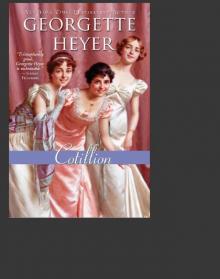 Cotillion
Cotillion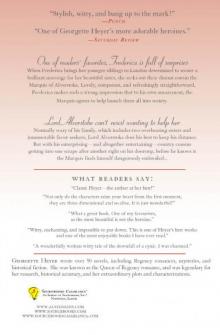 Frederica
Frederica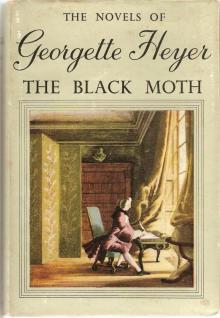 The Black Moth: A Romance of the XVIIIth Century
The Black Moth: A Romance of the XVIIIth Century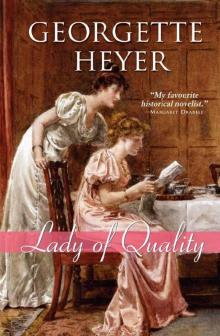 Lady of Quality
Lady of Quality Snowdrift and Other Stories
Snowdrift and Other Stories An Infamous Army
An Infamous Army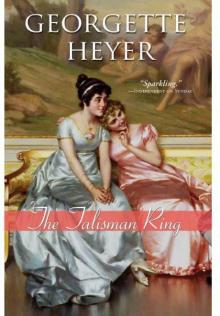 The Talisman Ring
The Talisman Ring Venetia
Venetia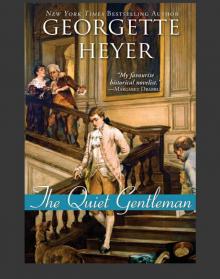 The Quiet Gentleman
The Quiet Gentleman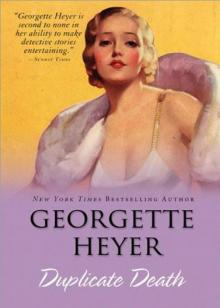 Duplicate Death
Duplicate Death Cousin Kate
Cousin Kate Black Sheep
Black Sheep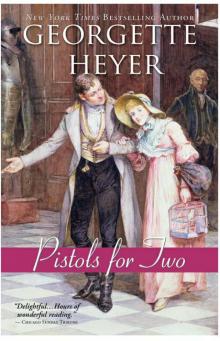 Pistols for Two
Pistols for Two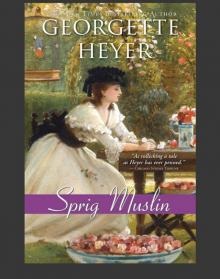 Sprig Muslin
Sprig Muslin No Wind of Blame
No Wind of Blame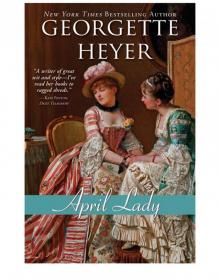 April Lady
April Lady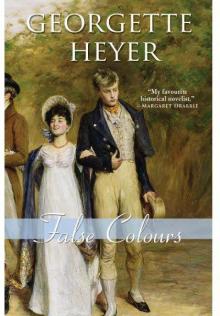 False Colours
False Colours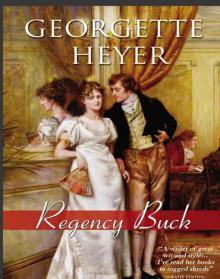 Regency Buck
Regency Buck The Toll-Gate
The Toll-Gate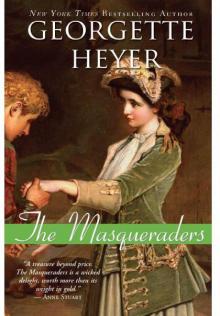 The Masqueraders
The Masqueraders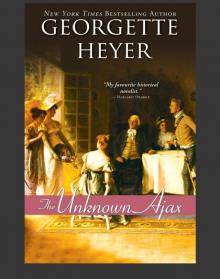 The Unknown Ajax
The Unknown Ajax The Grand Sophy
The Grand Sophy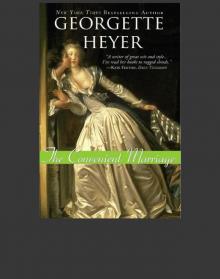 The Convenient Marriage
The Convenient Marriage Faro's Daughter
Faro's Daughter The Conqueror
The Conqueror The Foundling
The Foundling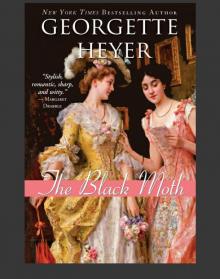 The Black Moth
The Black Moth The Transformation of Philip Jettan
The Transformation of Philip Jettan Friday's Child
Friday's Child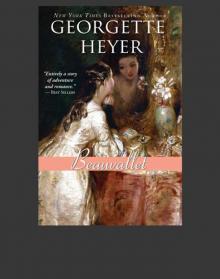 Beauvallet
Beauvallet They Found Him Dead
They Found Him Dead Charity Girl
Charity Girl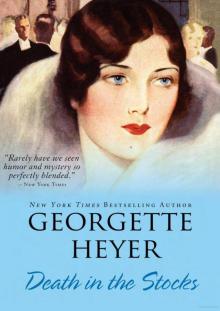 Death in the Stocks: Merely Murder
Death in the Stocks: Merely Murder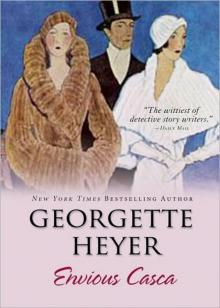 Envious Casca
Envious Casca Behold, Here's Poison
Behold, Here's Poison Arabella
Arabella The Nonesuch
The Nonesuch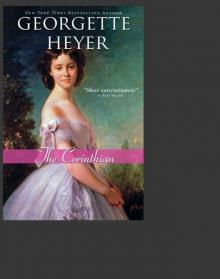 The Corinthian
The Corinthian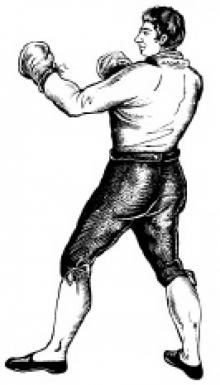 Jennifer Kloester
Jennifer Kloester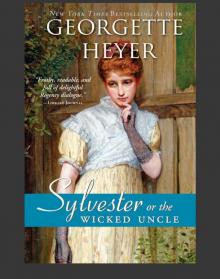 Sylvester
Sylvester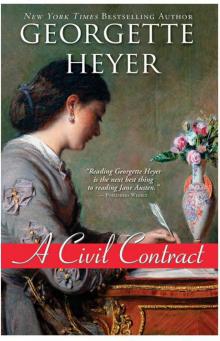 A Civil Contract
A Civil Contract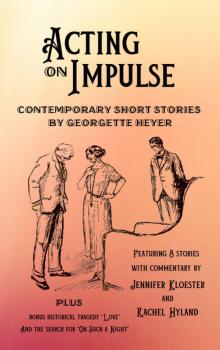 Acting on Impulse
Acting on Impulse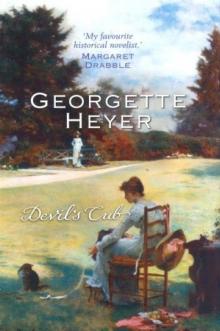 Devil’s Cub at-2
Devil’s Cub at-2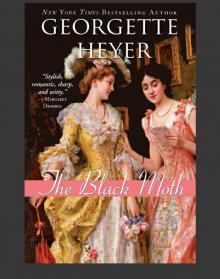 Black Moth
Black Moth Grand Sophy
Grand Sophy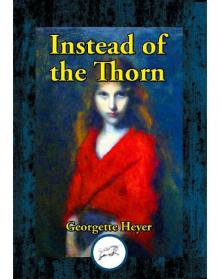 Instead of the Thorn
Instead of the Thorn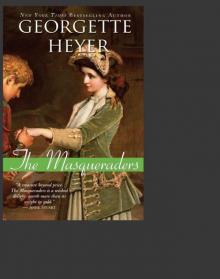 Masqueraders
Masqueraders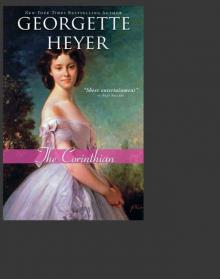 Corinthian
Corinthian Reluctant Widow
Reluctant Widow